In part 2, I take a look at the graphics, music, and voices in Mass Effect 2. How do they measure up?

There's nothing like using fire as a metric for a game's graphical goodness. Mass Effect 2 gets an A in the Incendiary Arts for effects like these.
Part 1: What is Mass Effect 2?
Part 2: Graphics, Music and Voice Acting
Part 3: Gameplay and Final Verdict
Graphics, music… voice acting?!
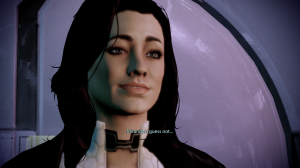
Miranda's face shows a rare moment of vulnerability. Superb facial animation helps to bring the player closer to his or her teammates.

Krogan are amazing to see up close (provided they aren't charging at you). Zoom in and take a look at all of that scaly detail!
Graphically the game is gorgeous. The cinematics are all top notch and mostly done in the game engine. This is a nice decision on the part of the developers because it allows them to use the Shepard that the player created, which would be impossible using pre-rendered cinematics. All of the models are textured with incredible detail and care. The lighting effects are also first-rate, whether it is choking smoke, concealing fog, or eerie shadows.
What is more impressive than the textures is the animation; it is clear that a huge amount of effort went into how the creatures and characters should move… and that effort paid off as the movement looks and feels real. Faces will show fear, joy, nonchalance, boredom, and rage. All of these emotions help to clue the player into what characters are thinking and how they are feeling, so it is useful to pay attention not only to what a character says, but what their expression is when they say it. Whether its a vicious Krogan slamming Shepard into a wall, or Asari dueling with powerful biotic powers, the world comes alive through the perfect melding of models and animation.

Missions take place in a variety of locations. One of the more scenic locations is this tropical beach. Make sure to bring some sunscreen.
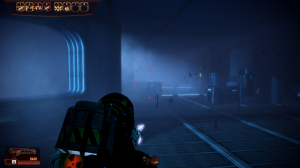
Shepard advances through an eerie environment. Look at that wonderful lighting. Absolutely gorgeous.
The environments are excellently designed as well. Some of the missions take place on claustrophobic locations: derelict ships, space stations, and caverns covered with organic goo. Other missions will take place in agoraphobic locations: tropical beaches, post-apocalyptic nuclear wastelands, and, one of my personal favorites: a planet with such intense radiation that the light from the star burns through your protective armor and shields, forcing the player to skitter from shadow to shadow like a rat. As an Infiltrator, this was right up my alley.
The visual mood of each level is complemented by a solid soundtrack. The orchestral score features many dark, ambient tones and has a sinister feeling to it. It fits the game perfectly. While overall it is a sinister score, there are also a few heroic songs as well, which help to offset the eerie ambiance. The music succeeds in evoking a wide range of emotions, from sadness, to pride, to desperation, but most of all fear that there are more bad things on the horizon. The music hits a nice spot in the musical spectrum of noticeability: it’s present and noticeable without being overpowering and feeling forced.
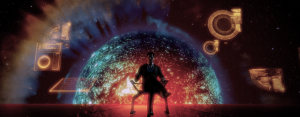
The Illusive Man sits in a space station above an unknown star, lighting cigarettes and trying to further Humanity's ascendancy to galactic domination. Should you trust him?
The world is further enhanced by the best voice acting in any game that I’ve ever played, period. Don’t get me wrong, I absolutely love computer games, but one thing that they have always been weak on is voice acting. Not so with Mass Effect 2. The reason is that the cast of characters are played by actual voice and television actors, rather than programmers who were in drama class in high school. In particular I love Seth Green’s take on the cocky pilot, Joker, and Martin Sheen as Shepard’s employer, the mysterious and morally dubious Illusive Man. Fans of Battlestar Galactica will also recognize the voice of Tricia Helfer, who plays the role of EDI, the Normandy’s onboard computer whose sense of humor is a little unsettling (“I enjoy the sight of humans on their knees… That was a joke.”). I haven’t played through the entire game yet as a male Commander Shepard, but I found his acting to be weaker than his female counterpart, but acceptable nonetheless. While not all of the performances are amazing, there are not any that are so woefully awful as to distract from the game, which is high praise given the sheer volume of dialog and number of characters.
All of these impressive media elements make for a game with amazing production values; the best I’ve ever played. But shiny graphics and having real voice actors doesn’t make a game, it makes a movie. Heck, I would totally sit down and watch many of the conversations and cutscenes as a Mass Effect movie and would be okay with forking over some cash to do so. But as a game, the real question is, how does it play?
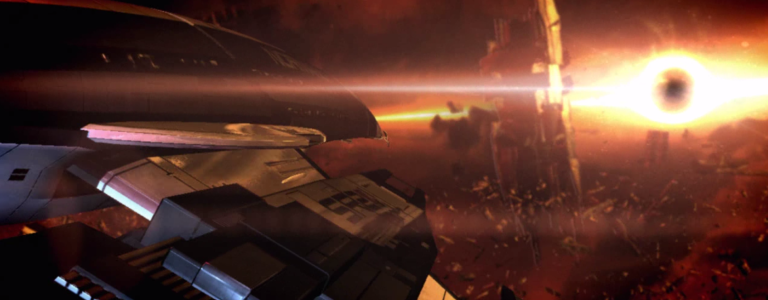
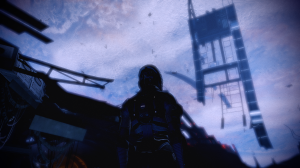
Comments